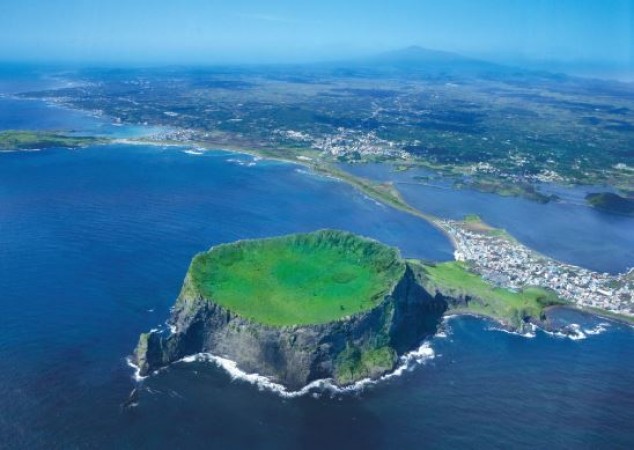
Jeju-si, often simply referred to as Jeju, is a captivating island located in South Korea. As the largest island in the country, Jeju has an area of approximately 1,849 square kilometers and is situated about 64 kilometers off the southern coast of the Korean Peninsula. Renowned for its stunning natural beauty, unique culture, and diverse attractions, Jeju has become one of the most popular tourist destinations in South Korea.
Geographically, Jeju is a volcanic island, and its landscape is a mesmerizing blend of picturesque beaches, lush forests, rocky cliffs, and rolling hills. The island is dominated by Hallasan, an inactive volcano and the highest peak in South Korea, which stands proudly at 1,950 meters above sea level. The mountain's crater forms a large caldera, creating a breathtaking setting for visitors to explore and enjoy.
Also Read: Exploring Piedmont: Italy's Enchanting Gem
The climate in Jeju is generally milder than mainland Korea, with mild winters and cooler summers. This makes it an ideal getaway for tourists seeking to escape the harsh weather conditions experienced in other parts of the country.
One of the island's most iconic features is its vast network of lava tubes and caves, formed by volcanic activity millions of years ago. The Manjanggul Cave is a particularly popular destination, with its impressive stalactites and stalagmites, creating a mesmerizing underground world waiting to be explored.
In addition to its natural wonders, Jeju is rich in cultural heritage and history. The island is home to many cultural sites and museums that showcase the unique traditions of the Jeju people. One such site is the Jeju Folk Village, which offers a glimpse into the island's traditional lifestyle through its well-preserved thatched-roof houses and cultural performances.
Also Read: Kom Ombo Temple: A Fascinating Ancient Marvel in Egypt
Jeju's cultural significance is also evident in the local language and folklore. The Jeju language, known as "Jeju Holo," is a distinct dialect spoken by the island's residents. The island is also famous for its Haenyeo, female divers who harvest seafood, showcasing their incredible diving skills and deep-rooted cultural practices.
To further preserve its heritage, Jeju has been designated as a UNESCO World Heritage site, recognizing its unique natural and cultural significance.
The island's charm extends to its culinary offerings, with a variety of delectable dishes waiting to tantalize taste buds. Some must-try dishes include "black pork" - a local delicacy made from the meat of Jeju's special breed of black pigs, "hallabong" - a sweet and juicy citrus fruit unique to the island, and fresh seafood caught by the Haenyeo.
Also Read: Romania :A Land of Rich History, Natural Beauty, and Vibrant Culture
Jeju is not only rich in culture but also offers numerous leisure activities for visitors to enjoy. The island's beaches are perfect for relaxation and water sports, and the coastal paths offer picturesque hiking opportunities, taking travelers through breathtaking landscapes. Scenic spots such as the famous Seongsan Ilchulbong, also known as "Sunrise Peak," offer stunning views of the surrounding sea and make for memorable experiences.
For those seeking a bit of adventure, Jeju's outdoor recreational activities are sure to delight. From horseback riding and cycling to zip-lining over lush forests, the island caters to thrill-seekers of all ages.
Throughout the year, Jeju hosts various festivals and events that showcase its vibrant culture and traditions. The Jeju Fire Festival, held in March, is a spectacle where locals reenact age-old practices and rituals to ward off evil spirits and pray for a bountiful harvest.
Also Read: Suez, Egypt: Suez is a Seaport City
In addition to being a popular destination for leisure travelers, Jeju also serves as a hub for academic and scientific research. The island's unique geological features and diverse ecosystems have drawn the attention of scholars and scientists from around the world.
Transportation to and around Jeju is well-established, with direct flights from major cities in South Korea, China, and other Asian countries. Once on the island, tourists can explore its wonders through various means, including rental cars, buses, and organized tours.
Also Read: Volcano Manor Beckons: Unleash the Explorer Within You
Despite its popularity as a tourist hotspot, Jeju has managed to preserve its natural beauty and cultural heritage, making it a truly unique destination in South Korea. Its harmonious blend of tradition, modernity, and natural splendor continues to captivate visitors from all walks of life, ensuring that Jeju will remain a beloved gem in the East Asian travel landscape for years to come.
Also Read: Warsaw: The Resilient Heart of Poland
Embracing Freedom: Unraveling the World of Digital Nomadism
Incredible India: The Top 10 Spots for a Fantastic Family Vacation